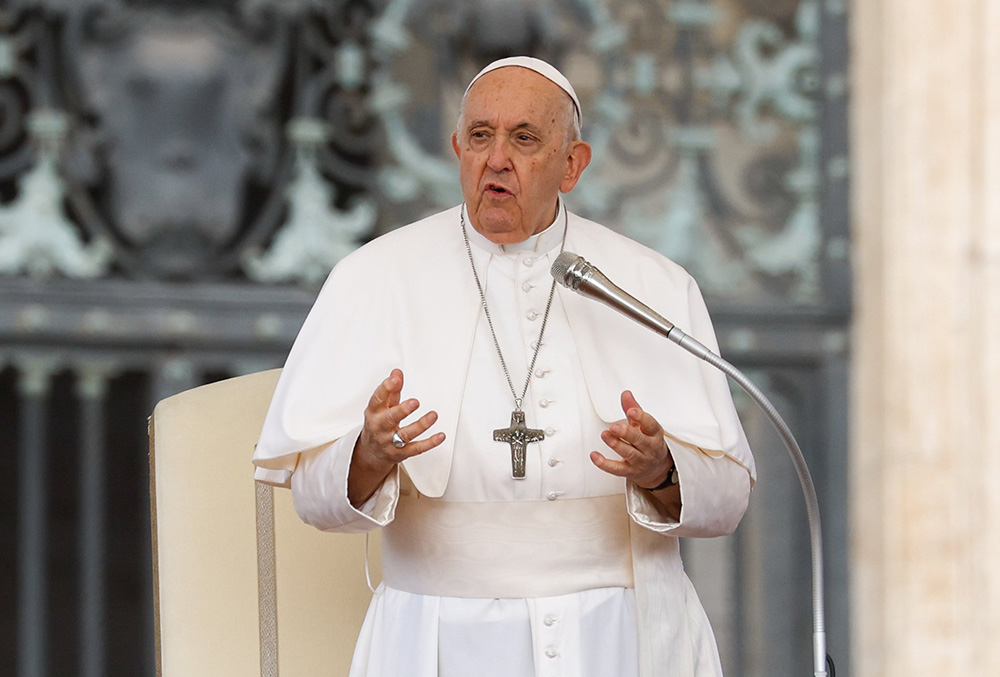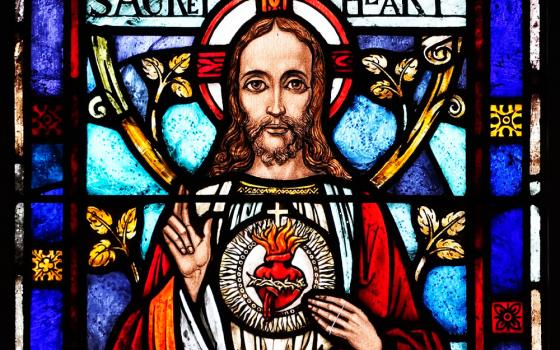
Pope Francis begins his weekly general audience in St. Peter's Square at the Vatican Oct. 18. (CNS/Lola Gomez)
The very first footnote in Pope Francis' new apostolic exhortation, Laudate Deum, released Oct. 4, is to a 2019 document from the U.S. Conference of Catholic Bishops where they say, "Climate change is one of the principal challenges facing society and the global community."
But the pope's praise for the U.S. bishops' handling of climate change was not returned with an equally enthusiastic endorsement of the exhortation by those same bishops. In a word, their response was underwhelming.
"USCCB President Archbishop Timothy P. Broglio has been on retreat with the Synod delegates and is participating in the opening sessions. Archbishop Broglio and his brother bishops in the United States look forward to spending time with the exhortation in prayer and identifying ways to continue their shared witness on behalf of God’s creation," said a statement from James Rogers, the U.S. Conference of Catholic Bishops' chief communications officer.
That was it. That's the entire response.
While it's true there is a record of the U.S. bishops' promotion of care for creation and advocacy on climate policy, it's certainly not an issue on which the conferences' current leadership or spokespeople place much priority.
The conference's official response to Laudate Deum did not even warrant the attention of an actual bishop. Furthermore, its brevity and vagueness read more like an "out of office" kickback email than the "welcome" its title claimed it to be for the pope's new exhortation on the environment.
Were it not for an indistinct mention of "God's creation" at the end, readers would not even know about which exhortation the so-called statement speaks. All of this makes the conference's (lack of) response to Laudate Deum not just underwhelming, but also incredibly odd.
Advertisement
For comparison, the U.S. bishops' reception of Francis' 2018 apostolic exhortation, Gaudete et Exsultate, came from the desk of then-president Cardinal Daniel DiNardo. It included context about the level of ecclesial significance such a document carries, noting, "An apostolic exhortation is considered the second-highest form of papal teaching after an encyclical letter." That was followed by a summary of the letter with a handful of direct quotes and encouragement for "every Christian" to read the "wonderful" message from the pope.
Similarly, the 2016 post-synodal apostolic exhortation Amoris Laetitia was met by the U.S. bishops with a statement from then-conference president Archbishop Joseph Kurtz. The statement included a summary of the document, encouragement for "all" to engage with its teachings, and gratitude to the pope for his emphasis on the topic of marriage and family life.
In response to 2019's Querida Amazonia, then-president Archbishop José Gomez summarized the document and thanked Francis for his "wisdom" and "guidance." And 2019's Christus Vivit had a full welcoming committee with a statement from then-president DiNardo along with two committee chairmen.
While not attributed to a conference president, Francis' 2013 exhortation, Evangelii Gaudium, still received an official statement of welcome from then-chairman of the Committee on Evangelization and Catechesis, Bishop David Ricken.
This time, in his report for Religion News Service, republished on NCR's EarthBeat, Jack Jenkins called the U.S. bishops' conference's response to Laudate Deum "subdued." Jenkins noted, "At the individual level, U.S. bishops are better known for activism that focuses on voicing opposition to abortion and LGBTQ rights efforts."
To that effect, it's not terribly surprising that the conference didn't meaningfully engage with an exhortation on the climate crisis. But the total disregard and apathy toward such a high-level papal teaching defies even already low expectations on the issue.
As faith-based environment groups, theologians and scientists, artists and activists and Catholic leaders in Africa offered interviews and page-long statements in response to the pope's letter on the climate crisis, one U.S. bishop after another turned down NCR's requests for comment.
Miami Archbishop Thomas Wenski finally broke that streak, telling NCR staff reporter Aleja Hertzler-McCain that he saw the pope's reference to the U.S. bishops' 2019 document as a recognition of the conference's long-standing work on climate.
On the contrary, Daniel DiLeo, associate professor and director of the justice and peace studies program at Creighton University, told EarthBeat he believes the pope's citation of the U.S. bishops' was "a strategic move to hold them to their own standard."
True or not, it seems that in 2023, that standard has been lowered.







